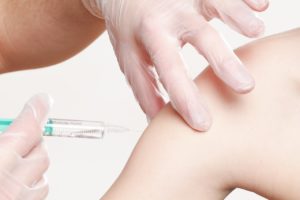DOH Recommends Mumps Vaccine as Outbreak Continues
The Hawaiʻi State Department of Health has confirmed 500 cases of mumps this year, including 12 reports of complications from mumps infection (e.g., hearing loss, orchitis, etc.).
The DOH is now recommending that the public consider receiving an additional dose of the MMR vaccine as a preventive measure.
“Since March, a steady stream of cases has been occurring, and we are now beginning to see more communities involved in the outbreak,” said State Epidemiologist Dr. Sarah Park. “The disease continues to affect both vaccinated and unvaccinated individuals, which prompted us to review data from our cases and recommend an additional dose of MMR vaccine for those who meet the criteria below.”
To help prevent the spread of mumps, DOH recommends the following persons born in 1957 or later, especially those who live, work, or attend school in crowded conditions, receive a dose of MMR vaccine now: those who received one MMR dose five or more years ago; those who received two MMR doses 10 or more years ago; and those with no or unknown vaccination history. In other words, for persons born in 1957 or later:
| Number of previous MMR doses | Years since last MMR dose | Vaccinate Now |
| 2 | 10 years or more | Yes |
| 1 | 5 years or more | Yes |
| None or unknown | – | Yes |
Since children routinely receive their second dose of MMR vaccine before entering kindergarten, the recommendation for the “outbreak MMR dose” applies to adolescents and young adults.
The DOH says university and college students are particularly vulnerable because they live, work, and/or attend school in crowded settings and tend to be in the age group in which most cases have been occurring. Therefore, university students, among other similar groups, are especially encouraged to receive the outbreak MMR dose as per the criteria below.
Patients suspected or diagnosed with mumps should remain at home to avoid spreading the disease to others.
According to Hawaiʻi Administrative Rules 11-156, a person with mumps may not attend school, work, or travel for nine days after the onset of parotitis (swelling of the salivary glands). Those who have been exposed to mumps and are not vaccinated should not attend school, work or travel from day 12 through day 25 after exposure to the virus.
Mumps is spread easily through coughing, sneezing and touching objects or surfaces with unwashed hands.
Symptoms include fever, headache, swollen glands in front of the ears or jaw, tiredness and muscle aches.
To locate a vaccinating pharmacy click here or call the Aloha United Way information and referral line at 2-1-1.
More information about mumps and the ongoing investigation can be found on the DOH website.











